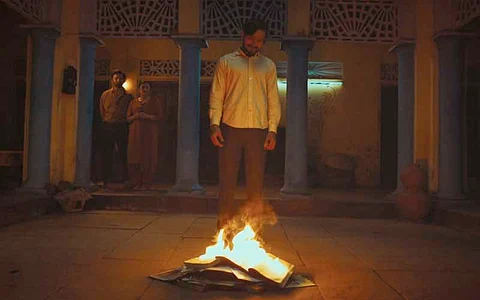
- In-Depth Stories
- Web Stories
- Reviews
- News
- FC Lists
- Interviews
- Features
- FC SpecialsFC Specials

Director: Ritam Shrivastav
Writer: Sarvesh Upadhyay
Cast: Kranti Prakash Jha, Nikitin Dheer, Vikram Kochhar, Pramod Pathak, Chitranjan Tripathi, Soundarya Sharma
Producer: Jatin Sethi, Piyush Gupta
Streaming Platform: MX Player
A bloodbath that ensues towards the end of Raktanchal is described by the local newspaper as "Khooni Tandav". Blood and mythology, always inseparable. Hindu myth is bathed in warfare, and moral conundrums; our gods murder, lust, anger, and give in to gossip, and yet demand divinity. Here, we have Vijay Singh (a brooding Kranti Prakash Jha), a man who despite telling people to not call him god or god-like, uses metaphors to refer to himself as Krishna, the cow-herding lothario, who propelled the violent war. The point, during the Mahabharata, and now, in late 80s UP, is the same: violence is moral, only if it is a necessary means to a moral end. This means there is good violence, and bad violence. This also means, there is a lot of violence. And to be honest, I am quite tired of it. (In the past few months MX Player has put out, among other shows, Bhaukaal, Ek Thi Begum, and Madhuri Talkies, all based on spiralling violence, the last of which I couldn't even stomach the trailer of.)
While Vijay Singh is the moral warrior, we have Waseem Khan (Nikitin Dheer), as the Ravana-incarnate, or the evil one. Everyone associated with him too, is thus evil. (Just to make sure we get this, there is a Dussehra scene where the Ravana effigy is burned against the backdrop of an assault on Waseem's right-hand-man.)

This whole spiral of violence begins when Vijay's father is killed by Waseem's company. Both of them end up pegging their ambitions to rising politicians, which means we get a violent, rigged election mid-way through the season. (We also get panderings for Ayodhya for vote bank politics, a precursor to Advani's Rath Yatra) There are coal mines, and cool blue lakes, bright weddings, and thick lush blood that pours as bullets empty into people with the slightest provocation.
The series starts in a government office with tenders being distributed illegally. This is corrected by Vijay Singh who ploughs through them, piercing a guy's hand through the spindle receipt holder. Vijay gets the tender. The evil person who initially bribed the government officer doesn't. Again, the fact that he gets this tender (not through the auction, but intimidation) is supposed to be good. The violence, is thus good violence. Are you understanding why I am concerned about the onslaught of violent films and series? We are slowly normalizing the idea of "good violence" because it seems to have a demand. This genre by definition is effacing of nuanced characters, and a larger female presence.
Violence can be cinematic. Gangs Of Wasseypur did it brilliantly, so did Rajneeti, though my favourite has to be Sonchiriya. Even Zee5's Gods of Dharmapuri, was quite enjoyable, and this is because the story does not entirely hinge on moments of violence. There are redeeming moments of quiet. Here, there are none. And if like me, the action set-pieces don't really keep you wanting, then really, what is there to look forward to?
Now, the series itself is shaky. It keeps rapidly moving between 1986, where all the action takes place, and quick flashbacks to establish motives and proclivities. But these flashbacks happen too often in the first few episodes, sometimes not entirely necessary, and so the beat of the story is lost. While it is shot with stunning colours, the beauty of the landscape is forgotten amidst the reckless feuding. People just keep shooting each other into oblivion, walking with impunity and rifles. I get it, this is a lawless land, in a lawless time (inspired by true events), but do you really expect a badminton exchange of dead bodies to hold the attention for more than a few episodes? (There are nine episodes, half an hour each.) Now though the accents and acting is quite convincing, and the climactic set-piece is shot dextrously, this overwhelming worry of violence becoming a genre as opposed to an adjective kept distracting me. But to be fair, it wasn't like much was happening while I worried myself silly- another person being shot, another betrayal, another excuse to show the perfect consistency of blood the production designers seemed to have concocted.